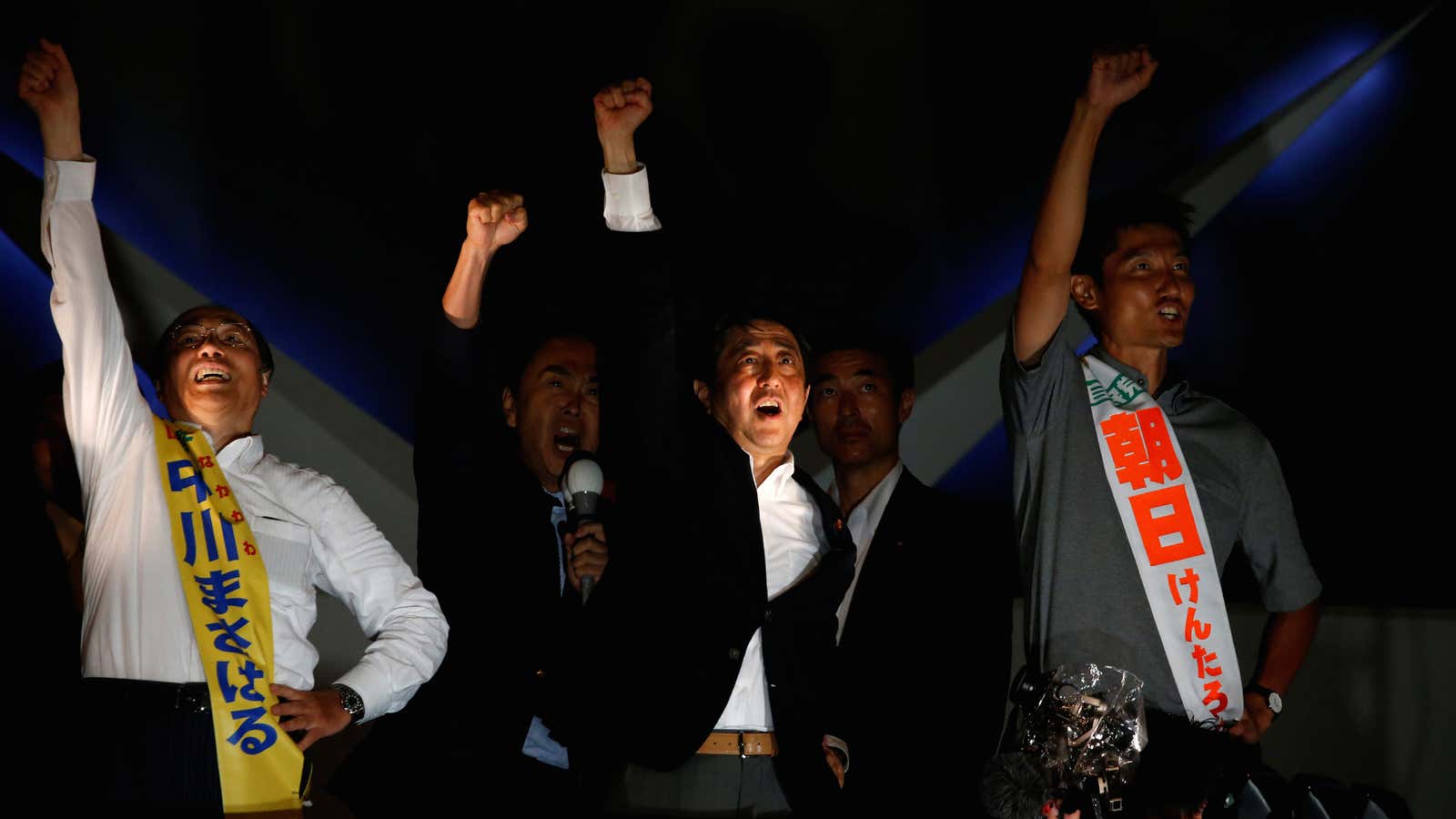Japan goes to the polls this Sunday (July 10) in an election that could eventually lead to the nation changing the pacifist clause of its constitution, turning its defensive army into a fully functioning military for the first time since World War II.
Much of the public opposes such a move. But the lack of a credible opposition party and prime minister Shinzo Abe’s downplaying of the issue during his campaign suggests a disaffected electorate will inadvertently enable the change anyway.
Rewriting Article 9 of the Japanese constitution, which renounces war and forbids Japan to threaten or use force as a means of settling international disputes, may very well be welcomed by the United States. Without constitutional limitations, Japan presumably would be free to become an effective military sidekick for the American superpower. But such a move would also have potentially far-reaching consequences for regional stability, specifically Japan’s relationships with China and Korea, Japan’s former wartime enemies.
Abe has previously made it clear that he wants to turn Japan’s self-defense forces into a fully fledged military, finishing a task started by his grandfather Nobusuke Kishi, who also served as prime minister. The change is also one of the founding principles of the Liberal Democrat Party.
Such ambitions will not be accomplished easily, however.
Changing the American-written constitution, a hot-button issue in Japan for the past 60 years, would require passing a motion with a two-thirds majority in both houses of the Diet (Japan’s bicameral legislature) and securing a 50% majority in a referendum. And yet, Abe’s party and other parties in favor of constitutional reform already hold two-thirds of the seats in the Lower House (the equivalent of the US House). This weekend they are hoping to clinch the same majority in the Upper House (the equivalent of the US Senate).
Abe is fully aware of public opposition to changing the pacifist clause—68% of Japanese were against it in a poll conducted by the Asahi newspaper in April. In what may be a purely political move, he has stopped talking about any constitutional revisions at all publicly. In campaign speeches, the politician has shifted focus to his “Abenomics” economic policy instead. But opposition forces and political commentators worry he has not in fact changed his mind about Article 9. Some have even accused him of trying to pull the wool over the electorate’s eyes.
“It’s a case of whether the public is going to be tricked three times,” says Koichi Nakano, political science professor at Tokyo’s Sophia University. “Before each of the elections Abe has fought in recent years, he talked about the economy. And after the elections were over, he put the emphasis each time on something else.”
Such a move is not without precedent, at least not from Abe’s LDP party. After the last Upper House election in 2013, the Liberal Democratic Party pushed through a state secrets law that it had not mentioned in its election manifesto. And after winning a Lower House election in December 2014 on the back of economic rhetoric, the LDP defied public protests to push through a security bill that allows “collective self-defense,” meaning Japanese troops can now fight overseas if it or a close ally is attacked and Japan feels threatened.
Abe’s military ambitions have already provoked anger in China, which accuses him of sabre-rattling. Relations between the two countries have soured since 2010, as arguments over disputed islands spark scuffles between Chinese and Japanese boats and Japanese’s air force scramble Chinese jets amid “escalating” military activity. How badly China would react to a remilitarized Japan is not clear, but it is exceedingly unlikely to ignore such a clear challenge to its dominance.
Globally, a change could lead to Japanese troops joining Western coalitions in the Middle East and other hot spots. “If you have a revision of the constitution and Article 9, Americans would perhaps expect, although maybe not immediately, Japan to play the role that the UK does on the global stage,” says Nakano, referencing a 2012 report that concluded greater military cooperation during “peacetime, tension, crisis and war” would deepen the US-Japan alliance.
Meanwhile, polls suggest a low voter turnout. If true, Abe will more than likely get his desired two-thirds majority in the Diet. Analysts say he is then likely to kick off the process of constitutional reform—perhaps beginning with a less controversial change, such as adding an article to give the government extra powers in the event of an emergency, before trying to revise Article 9.
If Abe decided to take the question to the public using a referendum, abysmal opposition voter turnouts during Abe’s rule, little experience of referendums, and an increasingly muzzled media could mean garnering a majority would be an easier feat than opinion polls currently suggest.
And as the UK’s prime minister David Cameron now knows, referendums can turn out surprising, and sometimes scary, results.




